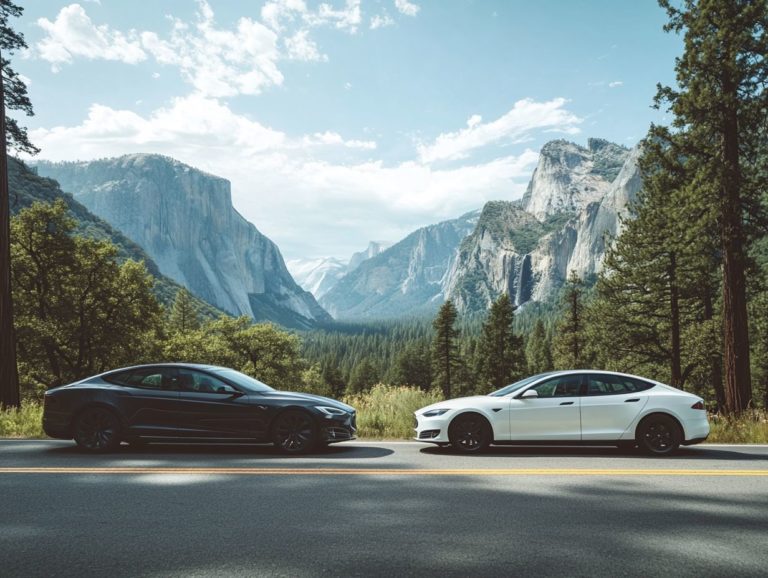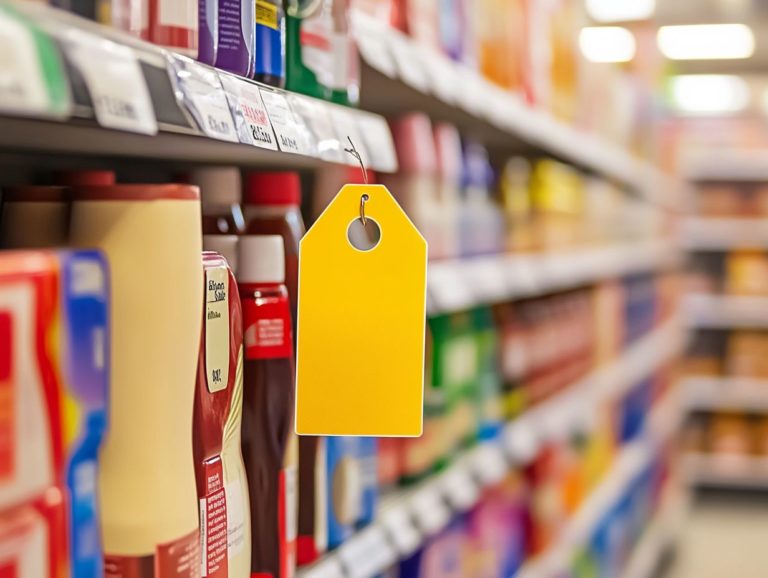Key Metrics for Comparing Car Prices
Navigating the world of car buying can feel overwhelming, especially when understanding prices. With many makes, models, and features to consider, making an informed decision is crucial.
This article outlines key factors to evaluate when comparing car prices, such as MSRP (Manufacturer’s Suggested Retail Price) and depreciation—the decrease in a car’s value over time. It also introduces practical online tools to simplify your search and help you secure the best deal.
Explore this guide to make your car-buying journey smoother and smarter.
Contents
Key Takeaways:
- Comparing car prices is essential for making informed decisions and getting the best deal.
- Consider important metrics like MSRP, true market value, depreciation, and cost of ownership.
- Online tools like websites and apps can simplify the process of comparing prices and finding great deals.
Why is it Important?
Understanding the used car market is essential for both dealers and consumers. Various performance indicators affect vehicle desirability. Making informed decisions based on solid data can significantly boost a dealership’s profitability. By leveraging market conditions, you can adjust pricing strategies to optimize returns while aligning with customer expectations.
Key metrics like inventory turnover and the average age of vehicles reveal your dealership’s health. High inventory turnover indicates efficient sales processes, positively impacting cash flow. Conversely, older stock may suggest it’s time to reevaluate pricing tactics or marketing efforts.
Use data-driven insights to align your approach with current trends, enhancing consumer engagement and satisfaction. Ultimately, a better understanding of these dynamics empowers you to respond effectively to market fluctuations and anticipate shifts that could influence sales and reputation.
Factors to Consider
When comparing car prices, several key factors influence your decision. Consider competitive pricing, the vehicle acquisition process, and sales efficiency.
Understanding inventory management helps you spot the best deals and ensures you make a savvy investment in the used car market.
Make and Model
The make and model of a used car greatly affect its desirability and resale value. Brands like BMW, Audi, and Toyota tend to have higher demand and competitive pricing. Analyzing auction data can provide valuable insights into market trends, enabling informed purchasing decisions.
For instance, the Toyota Corolla consistently ranks high in resale value due to its reputation for durability. In contrast, luxury models like the BMW 3 Series may exhibit price fluctuations based on features and mileage. Cars like the Honda Accord and Ford Mustang enjoy loyal followings, enhancing their desirability and market stability.
Check auction results to identify which models retain value and which are losing traction. This knowledge allows for strategic purchasing that aligns with performance needs and budget considerations.
Features and Options
Features and options in a used car are crucial to its market value. Prioritize fuel efficiency, interior comfort, and advanced infotainment systems as you evaluate a vehicle. Factors like vehicle history reports and warranty coverage can also influence your perception, often increasing your willingness to pay a premium.
For dealerships, effective inventory management practices are essential. It’s not just about tracking popular features; it’s also about aligning inventory with evolving consumer preferences. This approach maximizes turnover and ensures that high-demand models are always available when you’re ready to purchase.
Condition and Mileage
The condition and mileage of a used car influence its value and appeal. Cars in better condition with lower mileage generally sell for higher prices and are seen as more trustworthy investments.
Knowing how cars perform helps you set their selling price. For example, research shows that the average vehicle loses about 15% of its value each year, but this rate can increase with higher mileage. A car that has surpassed 100,000 miles may depreciate at almost double the typical rate.
Both aesthetic and mechanical conditions matter! A well-maintained exterior and interior dramatically enhance perceived value. Industry standards reveal that cars around five years old with fewer than 60,000 miles tend to retain about 60% of their original value, highlighting the impact of diligent upkeep.
Key Metrics for Comparing Prices
When comparing car prices, evaluating key metrics is vital to understanding the true value and potential costs associated with used vehicles. Metrics like MSRP, true market value, and depreciation rates offer essential insights into pricing strategies and ownership costs.
Grasping these indicators empowers you to make informed, data-driven decisions in the competitive car market!
MSRP and Invoice Price
The Manufacturer’s Suggested Retail Price (MSRP) and invoice price are pivotal figures you should know when evaluating a used car’s value. The MSRP acts as a benchmark for fair selling prices, while the invoice price reveals a dealership’s costs.
Understanding these figures enhances your negotiation skills and pricing approach. Mastering these concepts helps you navigate the complex terrain of used car purchasing with confidence.
For dealerships, the relationship between MSRP and invoice price is crucial for effective inventory management and sales tactics, shaping offers for potential buyers.
With this knowledge, you’ll be able to make informed decisions, helping you identify fair deals amid varying price points. This insight elevates your negotiations and reflects broader trends within the automotive market, essential for financial planning.
True Market Value (TMV)
True Market Value (TMV) reflects a used car’s fair market price, considering current conditions and demand. This value is influenced by various metrics, guiding buyers and sellers in establishing competitive pricing.
To grasp TMV, analyze factors like a vehicle’s make, model, age, mileage, and condition—all of which impact its market desirability. Knowing TMV helps buyers make informed choices and enhances negotiation skills!
Sellers benefit too! Understanding TMV allows them to set competitive prices, attracting more buyers while maximizing profits. Auction data serves as a valuable resource, capturing real-time transactions and reinforcing market trends.
This insight empowers you to align pricing strategies with current buyer behavior, ensuring you stay competitive.
Depreciation and Resale Value
Depreciation and resale value shape the used car market, influencing both buyers’ decisions and dealership profitability. Understanding how depreciation impacts vehicle value helps you forecast future resale prices, supporting smart budgeting and inventory management.
Different makes and models experience depreciation at varying rates, informing purchasing strategies and sales tactics. Luxury vehicles typically lose value faster due to their higher initial costs, while popular models from reputable brands tend to retain their value.
Monitor key indicators like average resale value after three years or depreciation rates per mile driven to assess a vehicle’s market worth. Both buyers and sellers should keep a close eye on these metrics to make informed decisions.
Cost of Ownership
The cost of owning a used car extends beyond the initial purchase price. It includes expenses like insurance, maintenance, and fuel. Understanding these costs is essential for smart budgeting, whether you’re a savvy consumer or a dealership aiming to boost profitability through intelligent operations.
Besides immediate outlays, factors like depreciation, financing rates, and vehicle reliability significantly contribute to overall ownership costs. This understanding helps you make informed decisions about vehicles that fit your budget.
For dealerships, recognizing these costs sheds light on customer preferences and aids in developing financing packages that resonate with buyers. Ultimately, understanding the broader spectrum of ownership costs lays the groundwork for enhanced performance metrics and refined operational strategies.
Using Online Tools for Comparison
Leveraging online tools to compare used car prices can greatly improve your purchasing journey’s efficiency and effectiveness.
Websites and apps that aggregate data from platforms like Craigslist and auctions become invaluable resources, enabling accurate vehicle price assessments.
This empowers you to devise a robust sales strategy aligned with current market conditions, ensuring informed decisions at every step.
Websites and Apps for Car Price Comparison
Numerous websites and applications facilitate car price comparison, giving you the tools to make informed decisions when purchasing a used vehicle. These platforms enhance online response rates and customer engagement by providing detailed information on pricing, features, and availability.
In addition to competitive pricing, these tools often feature user reviews, comprehensive vehicle histories, and side-by-side comparisons, giving you the confidence to weigh options. Popular platforms like Kelley Blue Book and Edmunds offer trusted expert insights, while apps like CarGurus and TrueCar utilize real-time pricing algorithms to showcase the best deals.
These digital resources typically have user-friendly interfaces and mobile compatibility, allowing effortless navigation from anywhere. You can also access support through chat features and FAQs, ensuring prompt assistance throughout your car-buying journey.
Frequently Asked Questions
What are key metrics for comparing car prices?
Key metrics include MSRP (Manufacturer’s Suggested Retail Price), invoice price, market value, and total cost of ownership.
What is MSRP and why is it important?
MSRP is the price set by the manufacturer for a new car. It serves as a starting point for price comparisons and is often higher than the actual selling price.
What is Invoice Price?
Invoice price is the amount the dealer pays the manufacturer for the car. It is usually lower than MSRP and can serve as a good negotiation starting point.
Why is Market Value Important?
Market value is the current selling price based on demand, supply, and location. It indicates what buyers are actually paying and helps determine if a car is fairly priced.
What is Total Cost of Ownership?
Total cost of ownership encompasses all expenses related to owning a car, including fuel, insurance, maintenance, and depreciation. This helps you understand long-term costs when making comparisons.
What Other Factors Should You Consider?
In addition to key metrics, consider financing options, incentives, rebates, and resale value. Look at the complete picture, not just the initial price.
Ready to start your car-buying journey? Use the tools mentioned above to find the best deals and make informed decisions!

.jpg_00.jpeg)
.jpg_01.jpeg)
.jpg_10.jpeg)
.jpg_11.jpeg)




